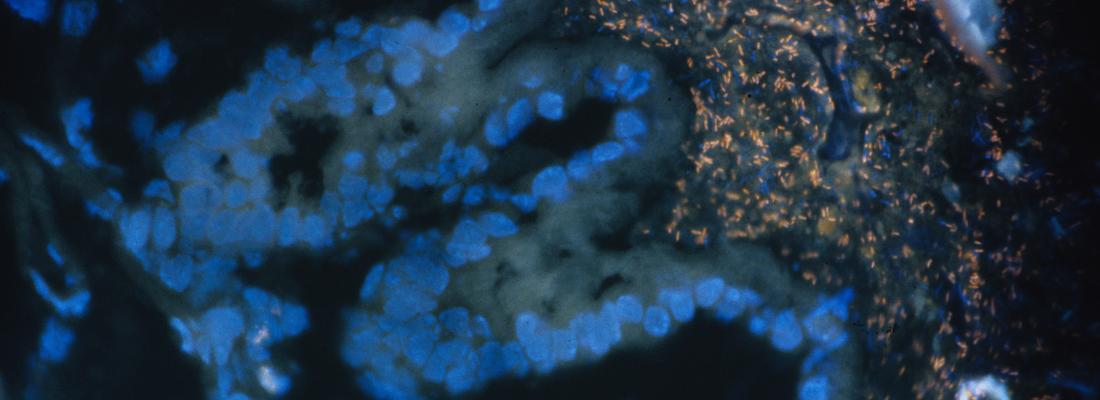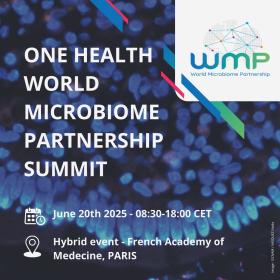Leveraging the microbiome for global health
Published on 27 June 2025

Long perceived as threats, microbiomes are now recognised as key players in living systems. The gut microbiota, in particular, plays a vital role in digestion, immunity, and metabolism. Its imbalance increases the risk of chronic diseases such as diabetes, obesity, and inflammatory disorders. These micro-organisms are also present across all environments, including natural ecosystems, soils, plants, and animals, and are essential for maintaining ecological balance: soil fertility, ecosystem resilience and health, climate regulation, and biodiversity preservation. Such interdependence calls for an integrated vision of health, as advocated by the One Health concept promoted by WHO, FAO, WOAH, and UNEP.
In this context, the 20 June summit marked a foundational step in placing the microbiome at the heart of global priorities at the intersection of health, agricultural, and environmental policies. As Emmanuelle Soubeyran, Director General of the World Organisation for Animal Health (WOAH), noted, "The role of microbes in the One Health approach is only beginning to be understood: we are at the dawn of a vast research frontier", while highlighting the potential of the World Microbiome Partnership to structure this momentum as a collaborative platform bringing together academia, industry, policy-makers, and civil society.

Focus
The microbiota: breakthroughs and new frontiersRecent discoveries on the role of the gut microbiota represent a major turning point in our understanding of health. By uncovering its connections with a wide range of diseases, researchers are paving the way for a profound transformation of medical practices.This special feature from our revue Ressources looks back at the key advances that have made this scientific revolution possible.
France is fully committed to this agenda, in close partnership with the international scientific community. “INRAE is establishing itself as a driving force in this transition,” stated Philippe Mauguin, Chair and CEO of the institute. “Our mission is to contribute to the development of One Health science, commensurate with contemporary challenges, in collaboration with leading global institutions, guided by open science, sound governance, and evidence-based policy.” INRAE is actively involved in several multilateral initiatives, including PREZODE, the World Microbiome Partnership, and the upcoming One Health Summit, convened by the President of the French Republic on 3 November.
“Our mission is to help build a One Health science that rises to today’s global challenges.” Philippe Mauguin, INRAE CEO
In the same spirit, Yasmine Belkaid, Director of the Institut Pasteur, reaffirmed her institute’s commitment to promoting “an ecological approach to microbiology, to understand how changes in environment, diet, and lifestyle influence microbial communities and global health.”

Towards a global research and policy agenda
International scientific leaders presented how microbiome research contributes to addressing global challenges in public health, food systems, and the environment. Didier Samuel, Director General of Inserm, underlined the role of the microbiome as “one of the driving forces of personalised medicine.”
Specialists convened in seven thematic working groups to share their priorities. The discussions highlighted concrete needs, reinforced scientific coordination, and laid the foundation for future international collaborations.
- For instance, a group working on FAIR data proposed establishing a shared database to enable comparison of bioinformatic datasets on ocean microbiomes.
- Another group, focusing on regulatory frameworks, is considering the development of a shared information platform to support authorities in evaluating and overseeing microbiome-related innovations.
Given its major innovation potential across health, agriculture, and the environment, the microbiome is now attracting strategic interest from both scientific and institutional stakeholders. For several years, INRAE has led cutting-edge research on microbiota interactions with human health, food systems, and ecosystems. This dynamic is supported by national and European flagship initiatives such as the PEPR SAMS, and by emblematic projects like MétaGénoPolis, Ferments of the Future, and The French Gut.
The International Priority Programmes (PPI) form one of the pillars of this strategic vision. Launched in 2022, the PPI on Microbiomes and Planetary Health enabled INRAE to co-lead two major initiatives: the European Microbiome Centres Consortium and the World Microbiome Partnership.
A joint declaration
As Philippe Mauguin declared, “We are at a pivotal moment to shape the future of the microbiome together. The World Microbiome Partnership is poised to become a key instrument of this collective ambition.” This ambition also relies on knowledge-sharing and public engagement. Thanawat Tiensin, Deputy Director General of the FAO, concluded: “It is essential that the public understands what a microbiome is. We must define clear strategies to engage with policymakers and build robust data infrastructures to support this process.”
The summit concluded with the adoption of a joint declaration reaffirming the strategic importance of microbiomes, in the lead-up to World Microbiome Day on 27 June. The declaration calls for microbiomes to be recognised as a fundamental component of the One Health approach in response to emerging threats – including non-communicable diseases, food system instability, and climate change.
This collective roadmap is structured around four key priorities:
- Integrating microbiomes into One Health policies, aligned with international frameworks and science-based recommendation
- Accelerating innovation through collaborative research, harmonisation of regulatory frameworks, and standardisation of data
- Strengthening global partnerships, with a focus on equity and inclusion, particularly towards countries in the Global South
- Enhancing microbiome literacy, through training, outreach, and integration into health and environmental curricula
